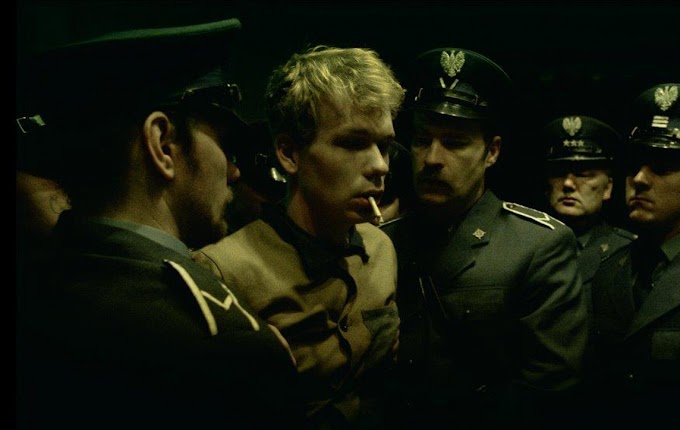Sixth Episode is the short version of A short story about love (1988), not only shortened but different in both its cut and conclusion. Tomek (Olaf Lubaszenko), a shy young postal worker, spies from the room sublet to him by a friend's mother, a neighbor in the building opposite, Magda (Grażyna Szapołowska), sexually very active. Obsessing about her, wishing to approach her, he manages to be responsible for delivering milk to her every morning, punctures her mail (which however he does not seem to open), calls her to his counter to collect this. which turns out to be false ... He ends up revealing his identity and his motives, to the dismay of the person concerned. Getting to know each other better (after however her current lover has slammed a fist in the boy's face), she invites him to her home, offers herself to him and, in the face of his premature ejaculation, plays a dirty trick on him. So it was just that, what he claimed was love. Deeply shaken, Tomek on his way home cuts his veins. Magda, immediately seized with remorse after sending him off to graze, worries about his fate, learns of the accident, inquiries about his condition. She becomes, in a paradox prepared by the old woman spying on them as they take action, the one who spies on Tomek, his return, his well-being. One day, she sees him behind a window. In a splendid shot, the focus, from the reflection of his face on a window pane, shifts to that of the boy in the background. He's no longer spying on her; he will explain when she meets him.

Since Fenêtre
sur cour, voyeurism in cinema has referred to the position of a cinephile
spectator, whether he likes it or not. this urge to watch, considered as
satisfying for itself. What does Tomek want, Magda asks him? He's not quite
sure himself: not to break into her house, not necessarily to sleep with her
(although he does accept her invitation in the end). Just watch her. He is not
completely wrong. Provoking a meeting, harassing her with phone calls is his
first mistake. Acting is either disappointing or dangerous. The disruption of
lust passes for him through a stolen privacy, then downright disturbed. Magda
doesn't hurt anyone. At least until she leads a virgin into her home for a
correction, a way of perverting a being confused as to the nature of his feelings.
his feelings, still in training ("It's unhealthy, at your age". The
fault is passed on from him to her. In the end, each will have something to
forgive the other, which opens up the possibility of a tie. (We dare not
imagine the result, if, less modest, the film had not confined itself to an
issue of mutual esteem but would have conceivably posed an idyll between the
two characters.) The shift in perspective is at the heart of the film. of its
formal treatment. Shift in perspective to match the evolution of the characters
- Tomek discovering Madga's sadness, Magda later realizing the reality of her
love, which is not just the physical desire she brought in to make fun of it.
The feeling of love is characterized by the absence of the loved one, the ignorance
of his point of view (when Tomek spies on Magda, we only know her through him;
when she does so in turn, it is he who is illustrated by his distance). We are
fully on the side of him, then her, who suffers from his love, who recognizes
the importance of the other in her own life to the capacity he/she has to
affect the person in love. In the end, there is not much about pleasure in this
reflection on the pain of loving.


.png)

0 Comments